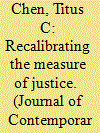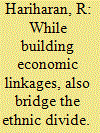| Srl | Item |
| 1 |
ID:
111974


|
|
|
| 2 |
ID:
122019


|
|
|
| 3 |
ID:
141061


|
|
|
|
|
| Summary/Abstract |
Academics and policymakers often argue that global health policy greatly affects and influences national health systems because these policies transfer and implant ‘best practice’ norms and accountability techniques into local health systems. On the whole these arguments about the ‘diffusion of norms’ have merit since there is considerable evidence to suggest the existence of a positive correlation between global norms and national behaviour. Nevertheless, this article argues that traditional analytical frameworks to explain norm diffusion underplay the fact that norms are significantly ‘glocalised’ by national actors and further discount the role that national leadership plays in strengthening health systems. In response, this article presents a ten-year comparative paired study of the participatory governance mechanisms of the South African health system and its health strengthening measures. In doing so, the role of the national government in their relations with the Global Fund to Fight AIDS, Tuberculosis, and Malaria (GFATM) will be examined and how key ‘partnership’ norms were amalgamated into health governance mechanisms. It will be argued that although global policy plays an important guiding role, health norms are never transcribed straightforwardly and a central element to successful health governance remains vested in the nation and the leadership role it exerts.
|
|
|
|
|
|
|
|
|
|
|
|
|
|
|
|
| 4 |
ID:
112439


|
|
|
|
|
| Publication |
2012.
|
| Summary/Abstract |
This article seeks to explain contradictions that have abounded in China's judicial reform, i.e. the juxtaposition of liberal and authoritarian characteristics. Incompatible phenomena came about because the post-1999 judicial reform has failed to rein in local and departmental resistance in key issue areas. China's national principals accepted the judicial system's policy prescription of administering the country by law, with an aim to reclaim central control over local state agents. However, the national leadership's varying political support to different aspects of judicial reform resulted in uneven outcomes and frustrated the goal of judicial centralization. In order to secure the goal, the national leadership has, since 2006, reinstituted more authoritarian policy imperatives into the existing liberal framework of judicial reform. China's post-1999 judicial reform has therefore oscillated between merit-based professionalism and allegiance-oriented demand. Conceptual incompatibility eventually led to behavioral contradictions and delivered mixed signals.
|
|
|
|
|
|
|
|
|
|
|
|
|
|
|
|
| 5 |
ID:
187172


|
|
|
|
|
| Summary/Abstract |
Two decades since its violent birth, Southeast Asia’s newest nation is stable and at peace with its neighbors, but domineering elder statesmen and reliance on oil revenue raise concerns.
|
|
|
|
|
|
|
|
|
|
|
|
|
|
|
|
| 6 |
ID:
126078


|
|
|
| 7 |
ID:
112955


|
|
|
|
|
| Publication |
2012.
|
| Summary/Abstract |
Instead of duplicating the media coverage of recent serious challenges to Yemen's national leadership in different parts of the country, this article draws on the best social science studies to help explain some of the forces behind Yemen's chronic instability, as well as to suggest what policies, programs, and management approaches might be most successful in moving the country and its growing population toward a more promising future. A state-of-knowledge review of the dated and geographically-limited literature conducted primarily by foreign social scientists covers national trends, the spatial distribution of Yemeni socioeconomic and political life (including tribes), non-tribal governance, and Yemen's social research infrastructure. The relevance of this research to two current American assistance programs in Yemen is also suggested.
|
|
|
|
|
|
|
|
|
|
|
|
|
|
|
|
| 8 |
ID:
117807


|
|
|